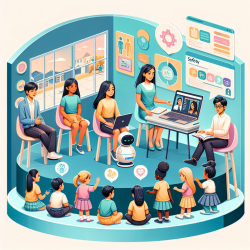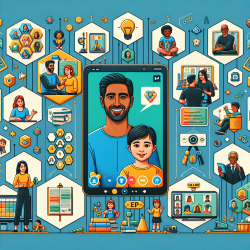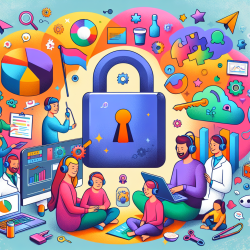In the ever-evolving landscape of education, the well-being and safety of our students remain paramount. As Speech Language Pathologists (SLPs) working within school settings, our mission extends beyond facilitating communication breakthroughs; it encompasses fostering an environment where every child feels secure and supported. In this light, the integration of online therapy into our educational toolkit has emerged as a beacon of safety, offering innovative solutions to traditional challenges. This piece aims to inspire my fellow SLPs to view online therapy not just as a tool for convenience, but as a robust ally in creating safer learning environments for our students.
The concept of safety within schools encompasses more than just physical well-being. It also includes emotional and psychological security, areas where speech therapy plays a critical role. For many students, the traditional therapy room, while a space of growth, can sometimes feel daunting. The transition to online therapy services, such as those provided by TinyEYE, offers an alternative that can alleviate some of these anxieties, making therapy accessible in a familiar environment for the child - their home or a quiet space in their school.
Online therapy brings with it a multitude of benefits that contribute to the safety and well-being of our students. Firstly, it eliminates the need for physical travel, reducing the risk of accidents and exposure to potential health risks, a particularly relevant advantage in times of global health concerns. Secondly, it provides a comfortable and controlled environment for students who may feel overwhelmed by face-to-face interactions. This aspect of online therapy is especially beneficial for children with anxiety disorders, autism spectrum disorders, or those who are simply shy.
Moreover, the flexibility and accessibility of online therapy support inclusivity and equity in educational settings. It ensures that students in remote or underserved areas, who might otherwise have limited access to specialized services, can receive the support they need. This democratization of access is a significant step towards ensuring that every child, regardless of their geographical location or socio-economic status, has the opportunity to thrive in a safe and supportive learning environment.
From a safety perspective, online therapy also offers enhanced privacy and confidentiality. Sessions can be conducted in a secure digital space, reducing the risk of unintentional disclosure of sensitive information. For students, knowing that their conversations are private can foster a sense of security, encouraging them to open up and fully engage in the therapeutic process. This is crucial for effective therapy, as trust and openness are foundational to the therapeutic relationship and to the student’s progress.
Additionally, online therapy platforms often include features designed to enhance safety and engagement, such as interactive tools and games that make therapy sessions more engaging for children. These features not only make therapy more enjoyable but also help in maintaining the student’s attention, leading to more effective sessions. Furthermore, the ability to record sessions (with proper consent) allows for a detailed review of the student’s progress, enabling tailored support that addresses their unique needs.
However, embracing online therapy requires a shift in mindset and the adoption of new strategies to ensure that the therapeutic alliance remains strong, even in a virtual setting. Building rapport with students online can be challenging, but it is not insurmountable. It involves being present, showing empathy, and using creative engagement strategies to foster a connection. The use of visuals, interactive activities, and even simple gestures like a warm smile can go a long way in making students feel seen and heard.
For SLPs, the transition to online therapy also involves a commitment to continuous learning. Staying abreast of the latest technologies and best practices in online therapy is essential to provide the highest level of care. This includes understanding the ethical considerations, ensuring data protection and privacy, and being adept at using the features of online therapy platforms to their full potential.
In conclusion, as we navigate the complexities of providing therapy in school settings, online therapy stands out as a powerful tool in our quest to create safer, more inclusive, and supportive learning environments. It offers a flexible, accessible, and effective means of delivering therapy, ensuring that every child has the opportunity to reach their full potential. For us, the SLPs, it challenges us to innovate, adapt, and continue our lifelong learning journey, all in service of the children we are privileged to support.
As we move forward, let us embrace online therapy with an open heart and a keen mind, recognizing its potential to transform the educational landscape. Together, we can make a difference, one child at a time, ensuring that every student feels safe, supported, and empowered to communicate their thoughts, needs, and dreams. The future of education is bright, and with online therapy, we have the tools to ensure that every child shines.










